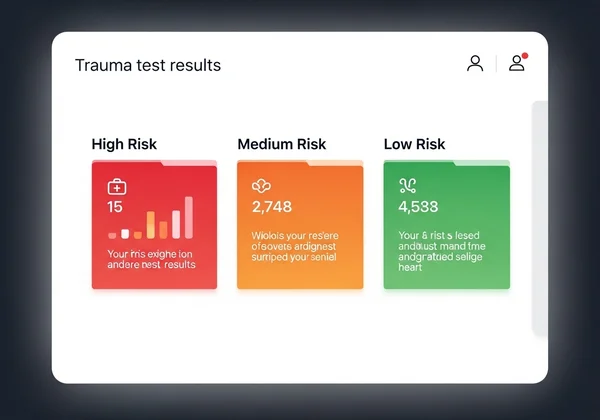Trauma Test Results: Understanding Your Score & Pathways to Healing from Psychological Trauma
July 13, 2025 | By Nora Hayes
Have you just completed your trauma test on our platform and are now wondering what your results truly mean? How do I know if I have trauma? This guide will empower you to understand your scores, interpret the insights from your personalized analysis, and confidently navigate your path forward. Your journey to understanding your emotional health begins here, and we're here to support you every step of the way.
Deciphering Your Trauma Score: High, Medium, Low Risk
After taking this assessment, you receive a primary score indicating your potential risk level for trauma symptoms. This initial feedback is designed to give you a quick overview, serving as a valuable first step in interpreting trauma score. It categorizes your responses into high, medium, or low risk, offering a broad indicator of how your experiences might be impacting your well-being. This is not a diagnosis, but rather a preliminary screen designed to help you explore your internal landscape.

What Does a "High Risk" Score Indicate?
A "High Risk" score on your psychological trauma test suggests that you've reported a significant number of symptoms commonly associated with psychological trauma. These symptoms might include intrusive memories, flashbacks, heightened anxiety, difficulty with emotional regulation, or challenges in relationships. Receiving a high score can feel overwhelming, but it's important to remember that this is simply an indicator to pay closer attention to your mental wellness. It signals that your past experiences may be having a substantial impact on your present life. This recognition is often the first step towards seeking the understanding and support you deserve. Exploring these patterns can be a powerful act of self-discovery.
Understanding "Medium" and "Low Risk" Results
A "Medium Risk" score means you've indicated some symptoms that could be related to trauma, but perhaps not with the same intensity or frequency as a high-risk individual. This level often points to the presence of milder or more subtle trauma responses, or perhaps early signs of distress. It's still a signal to acknowledge and explore your feelings. For example, you might be experiencing difficulties with sleep or occasional irritability, which could be connected to underlying stress or adverse childhood experiences (ACEs test).
A "Low Risk" score suggests that your responses do not indicate significant trauma symptoms at this time. While this can be reassuring, it doesn't invalidate any difficult experiences you may have had. Everyone processes events differently, and symptoms can manifest in varied ways or emerge later. Regardless of your score, any ongoing feelings of distress are valid and deserve attention. Remember, the goal of any online trauma test is to offer insight, prompting deeper self-reflection. If you're interested in taking the test yourself, you can always start your test.
Unlocking Insights with Your AI Personalized Trauma Analysis
One of the most powerful features here is the optional AI Personalized Trauma Analysis. While the initial score provides a general overview, this in-depth report goes much further, offering an AI trauma analysis guide that delves into the nuances of your specific experience. This unique feature leverages artificial intelligence to provide a contextualized understanding of your responses, helping you connect the dots between your feelings and potential underlying causes. It's a powerful way to gain a more personalized perspective on your trauma response test results.

How AI Personalizes Your Trauma Report
When you opt for the AI personalized analysis, you answer additional, confidential questions about your experiences, coping mechanisms, and support systems. This rich data allows the AI to generate a nuanced personalized trauma report. Instead of just a generic interpretation, you receive insights tailored to your unique situation. This includes potential challenges you might face, an analysis of your current coping strategies, and how these factors might influence your daily life. The AI doesn't "diagnose" you; instead, it provides a comprehensive narrative that can help you understand the patterns in your emotional and behavioral responses. It acts as a thoughtful companion on your journey of self-discovery, highlighting areas where you might benefit from further exploration.
Exploring Symptom Clusters and Their Meaning
The AI personalized analysis doesn't just list symptoms; it helps you understand what does unresolved trauma look like in the context of your life. It identifies "symptom clusters," which are groups of related symptoms that often appear together. For instance, you might see connections between feelings of detachment, difficulty forming close relationships, and challenges in trusting others. By highlighting these patterns, the report offers a clearer picture of how past events might be influencing various aspects of your life. It can shed light on why you react certain ways or experience specific emotions, validating your feelings and experiences. This deeper insight can be incredibly empowering, providing clarity that a simple numerical score cannot. To explore this feature for yourself, consider taking the free trauma test.
Your Actionable Next Steps After Getting Results
Receiving your trauma test results explained is a significant milestone. It's a moment of clarity that can open doors to understanding and healing. However, knowing your score is just the beginning. The next crucial step is to decide what to do after trauma test. Remember, this tool is a screening tool designed to empower you with initial insights, not to replace professional medical or psychological advice. Your path forward involves thoughtful consideration and, for many, seeking guidance.
Is Self-Diagnosis Possible? Why Professional Guidance Matters
Can you self-diagnose trauma? The answer is no. While an online trauma test like ours can provide valuable insights and a starting point for self-reflection, it cannot and should not be used for self-diagnosis. Psychological trauma, including conditions like PTSD test results or complex trauma, requires a comprehensive evaluation by a qualified mental health professional. They possess the expertise to conduct thorough assessments, differentiate between various conditions, and formulate an accurate diagnosis. Relying solely on an online screening tool for diagnosis can be misleading and potentially harmful, delaying access to appropriate care. We strongly advocate for professional guidance when navigating complex emotional landscapes. Your well-being is paramount, and expert support ensures you receive the most accurate assessment and tailored support.

Resources for Support and Seeking Professional Help
If your results suggest a high or medium risk, or if you simply feel overwhelmed by your findings, reaching out for professional help is a courageous and important step. Mental health professionals, such as therapists, counselors, and psychiatrists, can provide a safe space to process your experiences, develop coping mechanisms, and guide you on your healing journey. Look for specialists who are trauma-informed or specialize in trauma therapy modalities like EMDR (Eye Movement Desensitization and Reprocessing) or CBT (Cognitive Behavioral Therapy).
Here are some general resources to consider:
- Local Mental Health Services: Many communities offer publicly funded mental health clinics or services.
- Online Directories: Websites like Psychology Today or GoodTherapy can help you find therapists in your area.
- Crisis Hotlines: If you are in immediate distress, please reach out to a crisis hotline in your country. For instance, in the US, you can call or text 988.
- Support Groups: Connecting with others who have similar experiences can provide immense validation and a sense of community.
Remember, seeking help is a sign of strength, not weakness. You don't have to navigate this alone.
How Our Platform Can Continue to Support Your Journey
Even after receiving your results and considering professional help, our platform remains a valuable resource. Our blog offers a wealth of information on various aspects of trauma, from understanding the science behind your responses to exploring different healing modalities. You can find articles on topics like "What are the 4 types of trauma?" or insights into childhood trauma test impacts. We aim to be your gateway to understanding psychological trauma, making exploration easier and your life richer.
We encourage you to explore our comprehensive resources further. Whether you want to learn more about the complexities of trauma, understand different coping strategies, or simply read validating content, our site is here for you. Your ongoing healing journey is important, and we are committed to providing reliable, compassionate information every step of the way. You can discover your results and more helpful guides on our platform.
Embracing Your Path to Healing

Understanding your trauma test results is a significant step on your path to self-discovery and healing. Remember, these results are a guide, not a final destination. They provide initial insights that can empower you to seek further understanding and appropriate support. Our platform is here to empower you with knowledge and connect you to the resources you need for true transformation. By using our free and anonymous tool, you've taken a brave first step. Now, consider exploring our extensive content or seeking professional guidance to deepen your understanding and embark on your healing journey. Take the next step towards a richer, more understood life by visiting our platform and exploring our resources.
Frequently Asked Questions About Trauma Test Results
Can a Free Online Trauma Test Really Help Me?
Yes, a free online trauma test like ours can be incredibly helpful as a preliminary screening tool. It provides a convenient and anonymous way to identify potential trauma symptoms and gain initial insights into your emotional well-being. While it's not a diagnostic tool, it can serve as a valuable first step in acknowledging your experiences and prompting you to seek further information or professional support. You can try our free tool anytime.
How Does the AI Personalized Analysis Work?
The AI personalized analysis on this platform works by taking your initial test responses and then asking additional, confidential questions about your experiences, coping mechanisms, and support systems. Based on this comprehensive input, the AI generates a detailed report that highlights personalized insights, symptom patterns, and contextual information, giving you a deeper understanding than a simple score. This AI trauma analysis guide aims to offer a more tailored perspective on your unique situation.
What If My Results Don't Feel Right?
It's perfectly normal if your trauma test results don't immediately align with how you feel. Our experiences and emotions are complex. The test provides a snapshot, but it doesn't capture everything. If your results don't resonate, or if you still feel confused or distressed, this is a strong indicator to seek professional advice. A mental health professional can provide a thorough evaluation and discuss your concerns in detail. Trust your intuition, and consider visiting our site for more resources.
What Should I Do After Receiving My Trauma Test Results?
After receiving your results, the best next step depends on your score and how you feel. If you scored high or medium risk, or if you're experiencing significant distress, we strongly recommend seeking professional help from a licensed therapist or counselor specializing in trauma. Even with a low score, continue to prioritize your mental wellness by exploring our blog for more information and coping strategies, or simply to learn more about psychological trauma test approaches.
Is This Test a Diagnosis for PTSD or Other Conditions?
No, this trauma test is explicitly designed as a preliminary screening tool, not a diagnostic instrument. It cannot diagnose PTSD (Post-Traumatic Stress Disorder), Complex PTSD (CPTSD), or any other mental health condition. Only a qualified mental health professional can provide a clinical diagnosis after a comprehensive assessment. Our tool aims to raise awareness and guide you towards appropriate professional support if indicated.